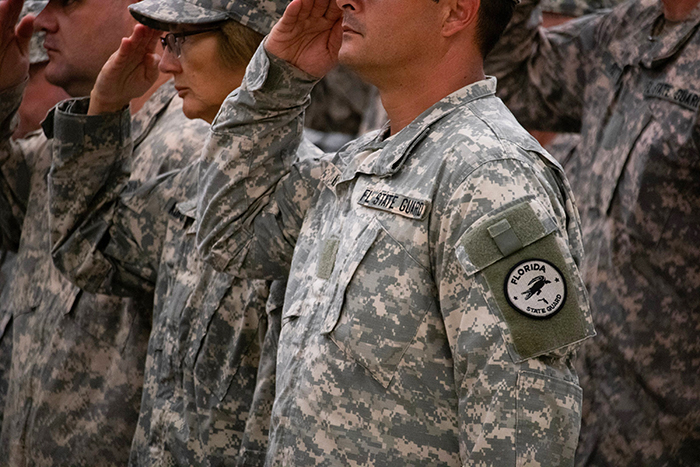The Dangers of DeSantis’s Militia

To push his extreme agenda, DeSantis has used the megaphone that comes with being governor, backed right-wing policy in the state and fought for his self-created culture war in court. However, he now has a new tool at his disposal – a state militia called the Florida State Guard, which includes a special police force and is solely under his command.
Florida State Guard members bow their heads in prayer during the Florida State Guard graduation ceremony at Camp Blanding Joint Training Center in Starke, Florida, on June 30, 2023. Some who volunteered for the force commissioned by Gov. Ron DeSantis said the group, billed as a natural disaster relief organization, had become too militarized. (Photo by Lawren Simmons/The New York Times)
An official with Georgetown Law School’s Institute for Constitutional Advocacy and Protection (ICAP) is concerned that the Florida State Guard (FSG) provides a way for members of illegal private militias and other extremists to gain legitimacy by claiming to act on behalf of Gov. DeSantis.
“I would be worried that people who harbor more extreme antigovernment views are going to be eager to join up,” ICAP’s policy counsel Jacob Glick told Hatewatch. “This [FSG] is a state backed carbon copy of how a lot of these illegal, private militia groups operate.” He noted that antigovernment extremists “fantasize about being recruited by Far-Right authoritarian politicians to do their dirty work.” Glick worries FSG establishes a structure whereby such groups as the Oath Keepers and Proud Boys can terrorize their perceived enemies with the air of state-sanctioned legality. Glick isn’t alone in these types of concerns.
Jason Van Tatenhove, who served as a high-ranking Oath Keepers official and now speaks out about the perils of the antigovernment movement, warned Hatewatch that FSG seems to be playing the same public relations game his old militia group did – saying FSG focuses on emergency preparedness when it actually concentrates on paramilitary and combat training. He described FSG as a “professional, private paramilitary organization that is extremely well funded.”
Task Force Butler, a non-profit that trains veterans in research and operations to counter extremism, portrays FSG as possibly the “single greatest direct cash infusion” the antigovernment militia movement has ever seen. Task Force Butler says it hopes veterans won’t see FSG as a positive way to continue serving their communities and country.
Despite multiple requests for comment, neither DeSantis’s office nor the Florida State Guard responded to Hatewatch.
When a governor who has declared himself the leader of a culture war and has the resume to prove it activates a militia that he has absolute control over, it shouldn’t be surprising that experts on extremism have concerns.
Since taking office, DeSantis has claimed to lead this battle by trampling on the civil rights of women, students, educators, immigrants and LGBTQ+ people.
He has signed several bills restricting voting rights, sometimes expressly overriding the desire of Florida voters, and used police officers to arrest past felons who weren’t aware that their right to vote had been revoked.
He has also deployed state police to send immigrants to New York and signed restrictive legislation targeting healthcare, education and paths to citizenship for immigrants. He has also set forth proposals for using deadly force at the border, ending birthright citizenship, deputizing state and local law enforcement to help manage immigration, requiring asylum seekers to wait in Mexico, and deploying the military to assist at the U.S. Southern border. In other words, his anti-immigrant stance is apparent.
With the FSG solely under the governor’s control, it is possible that DeSantis could deploy the guard in similar ways – which is a concern of experts interviewed by Hatewatch.
A revived militia
During World War II, Congress modified the National Defense Act of 1916, allowing states to re-establish their own state defense forces to subsidize the gaps left by federalized and deployed National Guard troops. The law specified that these state defense forces would be limited to duties determined by their respective state governors.
The Florida State Defense Force, created in 1941, lasted only until the end of World War II, when National Guard troops returned home. In 2022, DeSantis reactivated the Defense Force, renaming it the Florida State Guard.
Originally, the reviving legislation allotted the FSG 200 volunteers and an operating budget of $3.5 million. The FSG was originally given an expiration date of July 1, 2023; however, before the sunset date, new legislation was introduced to make the FSG a permanent fixture of the state military force alongside the National Guard.
This new legislation revised the structure of the FSG, creating a separate budgeting entity for the unit and allotting for an increase of members to 1,500. The budget also increased to over $100 million, including plans for helicopters, boats and cellphone-hacking technology. There is also an allotment of $10 million for a new training facility in Flagler County.
Some experts are expressing concerns about FSG’s scope and capabilities, given that it exists outside traditional military structures, with all the power resting with the governor. ICAP’s Glick notes the unique structure of the FSG, telling Hatewatch, “There has been a disturbing decoupling between the rest of Florida’s military infrastructure that involved the National Guard and the Florida State Guard.”
State guards are designed to exist as an auxiliary to the National Guard. Governors serve as the commanders-in-chief of state military forces, which could include the National Guard and state defense forces. Florida is an anomaly in that the FSG lacks the command structure of other military forces in the state.
The adjunct general, who serves as the senior-most adviser for the state’s military forces, no longer directs the FSG. Instead, power rests with a director who is appointed by the governor and reports directly to him. The person serving in that position has been a bit of a revolving door. In October, DeSantis named Marine veteran Mark Thieme as the third director since the guard was reinstated.
The FSG can be activated anytime that the Florida National Guard is activated, or when the governor declares a state of emergency, or to “preserve the public peace, execute the laws of the state, enhance domestic security, respond to terrorist threats or attacks.” As a result of the legislation restarting the FSG, DeSantis has the power to deploy it outside of Florida, like he has done with the National Guard to the Texas-Mexico border to assist with anti-immigrant missions.
Additionally, the FSG contains a specialized unit of its volunteers that are permitted to carry weapons and bestows upon them the same legal authority of a law enforcement agency. During a Senate appropriations committee meeting, the bill sponsor likened the unit to military police, saying that it was “sort of an M.P. law enforcement-type of entity.” The way FSG is structured, however, means its members, unlike the military police, aren’t bound by the Military Code of Conduct.
Kristofer Goldsmith, founder and CEO of Task Force Butler, expressed concerns over the necessity of a police force within FSG and the lack of accountability. He asked, “If the governor of Florida doesn’t think that law enforcement, the National Guard, the military and non-profits that deploy veterans for disaster relief are good enough to do their jobs and serve Florida, then how is the new Florida State Guard, which has been given vast powers with virtually no accountability or responsibility, going to be empowered to make positive change?” Without any accountability or transparency, Task Force Butler says FSG becomes an “extrajudicial” entity like other antigovernment militias.
Immediate trouble
In June, controversy rocked the first training class of the FSG when it was reported that several recruits left the 30-day training held at the National Guard base Camp Blanding. Brian Newhouse, a 20-year Navy veteran, told the Tampa Bay Times, “The program got hijacked and turned into something that we were trying to stay away from: a militia.”
Several resignations came from veterans concerned about FSG’s unstable leadership and paramilitary-style training. Volunteers, once issued khaki polo shirts and pants, were eventually made to do combat drills in fatigues with National Guard trainers yelling orders.
ICAP’s Glick also points out that, once the first recruit class of the FSG entered their 30-day training at the National Guard base, it was made apparent that volunteers were not being trained in emergency response to act as an auxiliary of the National Guard. “We’re seeing a highly militarized operation,” Glick said. “They are not really doing emergency prep, but hand-to-hand combat training and really intense militarized training operations.”
Goldsmith agreed with this assessment and noted what type of people are likely to be attracted to such training. “Anytime that the Florida State Guard is doing Oath Keepers training, it’s going to attract Oath Keepers,” Goldsmith said “When they start doing service to communities, they’ll attract people who want to actually serve their communities.” Considering FSG recruits are given military-style equipment and training, Goldsmith asked, “Why wouldn’t extremists take advantage of that new training opportunity?” He said he believes extremists will “gladly exploit” FSG.
Van Tatenhove provided insight into how the Oath Keepers’ paramilitary training was similar to what is happening with FSG. In an interview with Hatewatch, he said Oath Keepers strategically tried to avoid the term “militia” and portrayed itself as offering emergency preparedness training. However, Van Tatenhove said: “Ninety-nine percent of the actual training was small team tactics, like hasty ambush. This was down and dirty warfighting taught by actual warfighters that had done it.” In essence, the Oath Keepers publicly talked about khakis and polo shirts but really provided paramilitary and combat training. The FSG seems to be doing the same thing.
Dangers of the Florida State Guard
State militias have a troubled past – a centuries-old history of vigilantism, inexperience and extremism. During slavery, they were used to patrol and suppress insurrections. More recently, the governor of Texas directed the Texas State Guard to monitor a planned military exercise known as Jade Helm. The 2015 multi-state training became a central focus of antigovernment conspiracy propagandists, who claimed it would end in a declaration of martial law. The governor’s use of the Texas State Guard played into these one-world government conspiracy theories.
The Texas governor’s decision to use his state guard to intervene and monitor a federal operation is another cause for concern. “Even a subtle ask for the defense force to array itself in opposition to a federal operation on U.S. soil is the worst-case scenario,” Glick said. He pointed to the possibility of FSG being called in if another election is challenged, as with the 2020 presidential election.
U.S. Rep. Glenn Ivey of Maryland expressed his concerns about the FSG, asking the U.S. House Judiciary Committee to investigate the new legislation. In a letter, he referenced potential dangers posed by the FSG, writing that members “would carry weapons, make arrests, and may even monitor ballot boxes, track illegal immigrants, and respond to protests at the direction of the governor.” He concluded by stating that the FSG is a misuse of taxpayer dollars and requires oversight to prevent it being “weaponized for a single governor’s personal political purposes.”
DeSantis has previously deployed state police forces for voter intimidation and flying immigrants across state lines. The FSG creates an opening for extremists in support of these and other key points of DeSantis’ agenda to become deputized as law enforcement and deployed under FSG provisions.
At the graduation of FSG’s first class, DeSantis congratulated its members, saying, “We are ensuring that we have the manpower needed to respond during emergencies.” However, a document released from his office announcing the expansion of the FSG pointed to what DeSantis may consider an emergency. It stated that FSG is for responding to natural disasters, “but also in protecting its people and borders from illegal aliens and civil unrest.” Because these forces are volunteer-based, they generally rely on recruits who are likely to be the most passionate and committed to DeSantis’ vision for FSG.
“Ron DeSantis has fantasies about riots and cities collapsing,” Goldsmith said. “Not because a hurricane comes and floods the city … [but because] he is envisioning racist conspiracy theories like the Great Replacement starting riots. The militia [FSG] seems to be chasing Ron DeSantis’ fantasies.”
Based on the governor’s comments about his expansive right-wing agenda for FSG, the door may be open for bad actors seeking legitimacy and power. According to Glick, “The way that this is being advertised and covered seems to be a perfect fit for individuals who have been associated with private militias to now join a public constitutional militia.”
He points out ways in which the FSG may attract extremists, antigovernment activists and other bad actors, pointing out that many of the Proud Boys, the Oath Keepers and other militia groups that were involved in the U.S. Capitol attack use similar rhetoric as the FSG. As Van Tatenhove noted, Stewart Rhodes, founder of the militia-based Oath Keepers who was sentenced to 18 years in federal prison on charges of seditious conspiracy for his role in the Jan. 6 insurrection, always claimed that the Oath Keepers was a civic-minded organization focused on emergency preparedness.
“A lot of private militia groups that are unlawful, tout themselves as just disaster preparedness; basically, summer camp for adults. Then you dig beneath the surface, and they are providing training in weapons of war,” ICAP’s Glick said.
Goldsmith adds that DeSantis has been called on publicly to denounce extremists that have supported him and endorsed his agenda. However, the governor never does, and instead he either downplays their support or refuses to admit that extremists exist. Goldsmith said, given this dynamic, it is unreasonable to think the governor will take steps to make sure extremists are screened out of the FSG recruiting process. “I think they might welcome extremists,” he said. “They’d rather do that than admit that Florida has an extremism problem worth addressing.”
In promoting FSG, DeSantis sometimes focuses on its role in disasters and emergencies, while other times he concentrates on how FSG will be used for his culture-war issues. Not surprisingly, extremists find the latter messages appealing. Almost immediately after announcing the FSG’s resurrection, message boards on “alt-tech” websites lit up with talk from so-called patriots, making statements like:
I canot [sic] wait for the first Florida guard member to [Kyle] Rittenhouse a half dozen or so hoowite [sic] supremes at the polls next election. Desantis is off the chains triggerin [sic]these guys.
There was also antigovernment rhetoric, with nods to states’ rights. Some posters on social media expressed interest and support of FSG in a battle against the federal government, such as:
Florida will hold the line and stay red. The federal forces are either useless or actively working against us and contributing to the destruction of our country. This is a necessary move to secure our interests and combat tyrants in power.
While I appreciate the history, who cares what braindead zombies think. Good for FL for arming themselves against a tyrannical regime.
This is the way. There is no denying the Federal government is fully politicized. I can imagine a scenario where Florida takes a direct hit from a hurricane, and Biden refuses aid to Florida for retribution regarding COVID policy and god knows what else. States need to reclaim their Constitutional powers.
Far-right activist and conspiracy propagandist Laura Loomer also called on DeSantis to activate the FSG to secure elections and solve immigration, posting on Telegram:
I’m calling on Florida Governor Ron DeSantis to further secure our elections in Florida by strongly opposing and banning any and all Biden administration refugee resettlement in the state of Florida!
The State Guard should be activated and put on notice by the Governor to send a message to the Biden administration that if they get caught dumping anymore illegals or ‘refugees’ in the state of Florida, there will be LEGAL CONSEQUENCES!
DeSantis’s “war on woke” has played out so far in policy and litigation arenas. Now with a state militia, equipped with weapons, boats, planes, spyware and military training, DeSantis has a literal army of volunteers accountable to only him. Putting it simply, the ACLU of Florida called FSG an “unprecedented and terrifying abuse of power by the Governor.”
Glick, Goldsmith and Van Tatenhove all note the dangerous role FSG could play in the aftermath of the 2024 presidential election. Since DeSantis can deploy FSG out of the state, they wonder what would stop him from sending it to the U.S. Capitol to play a role in contesting election results in a scenario that sounds even worse than the Jan. 6 insurrection.
Additionally, since it is not required to stay in Florida, FSG and its training can go to other states. “This is going to be a whole new paradigm,” Van Tatenhove said. He added that FSG could train other militias or provide a template other authoritarian governors could replicate.
Photo illustration by SPLC
Article originally published on www.einpresswire.com as The Dangers of DeSantis’s Militia



